6 Apr 2020 | News and features, Volume 49.01 Spring 2020 Extras
[vc_row][vc_column][vc_custom_heading text=”Misinformation is everywhere and I don’t know who to trust, writes a Chinese writer, based in Nanjing” google_fonts=”font_family:Libre%20Baskerville%3Aregular%2Citalic%2C700|font_style:400%20italic%3A400%3Aitalic”][vc_single_image image=”113000″ img_size=”full” add_caption=”yes”][vc_column_text]
Wuhan doctor Li Wenliang told several of his friends in Chinese social media app WeChat to be careful because some patients had caught a SARS-like disease in his hospital. Within hours of this message being sent it had gone viral – without his name being removed. Li was then accused of rumour mongering. He was called to a local police station and reprimanded. But, not jailed, he returned to work, only to contract coronavirus himself. He died on 7 February.
In the wake of the outbreak of coronavirus, the internet police in China first tried to block information about the disease to maintain society order. This was what Li fell victim to. Then, as the situation became out of control, the main target of censorship moved to suppressing negative coverage, as China tried to position itself as a model country in the fight against coronavirus. There was no bad news, even though there was clearly bad news. Did people believe this positive coverage? It’s hard to tell. Looking at related topics on Sina Weibo, China’s version of Twitter, most comments have been complimentary. After the lockdown of Wuhan, the local medical system was overburdened. People who couldn’t get treatment asked for help on the internet, but the number of such messages fell from being in the thousands each day initially to hardly any later. Pictures of chaotic scenes in hospitals were removed.
The coronavirus is now storming throughout the world at an increasing speed and scale. It has greatly impeded global activities, as if a pause button on life has been pressed.
As the disease has spread around China, something else has been on the move – the intensification of censorship. While censorship existed before coronavirus, it has rapidly increased since then. And I fear this increase in censorship will not stop soon, even if the virus does.
During this time I have been in Nanjing, a former capital city near Shanghai. All I have been able to do is to watch official news and online discussions to see the latest development of the situation. But in China, where the news is tightly controlled, it’s really hard to identify the correct information. Misleading information is everywhere and you don’t know who to trust. I have felt helpless and the only thing I securely know I can do is to stay at home with family and pray for safety.
At the same time, there has been anger over the censoring of important information. In a recent interview published in the magazine Renwu, Ai Fen, head of the emergency department in a major hospital in Wuhan, recounted her experience. She told the magazine that she was the first to alert other people about the novel virus but was told by her hospital not to spread this information, not even to her husband. The article published on Renwu was quickly removed. And yet there have been many translated versions of the original, including in German, English, even Braille. We won’t let her testimony be deleted.
[/vc_column_text][/vc_column][/vc_row][vc_row][vc_column width=”1/4″][vc_icon icon_fontawesome=”fas fa-quote-left”][/vc_column][vc_column width=”3/4″][vc_custom_heading text=”She told the magazine that she was the first to alert other people about the novel virus but was told by her hospital not to spread this information, not even to her husband. The article published on Renwu was quickly removed.” font_container=”tag:h3|text_align:left” google_fonts=”font_family:Libre%20Baskerville%3Aregular%2Citalic%2C700|font_style:400%20italic%3A400%3Aitalic”][/vc_column][/vc_row][vc_row][vc_column][vc_column_text]
The impact of such severe censorship during this critical time has been catastrophic. The censorship carried out by the authorities during coronavirus is not vastly different to that that happens during other sensitive periods, such as around the Tiananmen Square anniversary, except that coronavirus is a global public health crisis, as pointed out by Lotus Ruan, a researcher from Citizen Lab. The censorship of neutral and even factual information related to the virus, which is completely unnecessary, might have limited the public’s ability to share and discuss critical knowledge of how to prevent the virus’ spread. For example, many elderly Chinese people refused to wear masks at the early stage of spread because the government claimed that the disease was preventable, containable and curable and there was no evidence that the virus was contagious between people. Even my grandparents thought I was making a big deal out of the virus.
There was a crucial time-lag of several weeks between when the first doctors started to notify people of the virus and when the authorities actually allowed it to be openly discussed and taken seriously.
China is now starting to come out of quarantine. And just in time for the traditional festival, Qingming, which was this weekend and commemorates the deceased. Residents in the city of Wuhan were allowed to take their departed family’s ashes from the funeral parlor. And yet we were all puzzled. Many web portals and social media platforms received orders not to report news about this, and there were security officers at sites to stop people taking photos. Such action has added more grief to this tragic scene. “The crowd were so quiet. No crying. No dirge. They just left with an urn in silence”, wrote someone on Weibo.
I am lucky. Nanjing has been a relatively safe place since the outbreak. Very few have been infected and as yet there have been no reported deaths. As for the residents of Wuhan, we can’t help but ask: have these people lost their right to mourn?
On 19 March, the official investigation on Li Wenliang’s death was released. It called for Li’s reprimand to be withdrawn and for two policemen who were involved in Li’s arrest to be warned as a punishment and response to the incident. Obviously, this is not enough in the view of the public. The true cause of Li’s tragedy is the deeply rooted censorship which has become a part of daily life. Anyone could be the next Li Wenliang.
[/vc_column_text][/vc_column][/vc_row][vc_row][vc_column][vc_column_text]
The author of this piece is a freelance journalist based in Nanjing, China.
Index on Censorship’s spring 2020 issue is entitled Complicity: Why and when we chose to censor ourselves and give away our privacy
[/vc_column_text][/vc_column][/vc_row]
1 Mar 2018 | China, News and features
With the historic announcement at the weekend that China would end the two-term limit on presidents, meaning the current leader Xi Jinping could be president for life, it created an online storm.
People took to the popular Chinese social media apps Weibo and WeChat to express either disdain and outrage. It didn’t take too long for the country’s well-oiled censorship apparatus to swing into action and ban all of the obvious terms related. Within hours, you couldn’t say “I don’t agree”, “migration”, “emigration”, “re-election”, “election term”, “constitution amendment”, “constitution rules”, “proclaiming oneself an emperor”, “Yuan Shikai (Former Emperor)” and “Winnie the Pooh” (more on this soon).
At the same time, Chinese citizens created and widely shared a series of memes. Most of these have since been removed, but not before enough people saw them, screenshots were taken and they were spread on media beyond the censor’s reach. Here’s an overview of some of the best:
King Winnie
The world’s favourite cuddly teddy bear, unless you’re a Chinese leader. After a meme likened the cartoon character with the Communist Party leader went viral in 2013, Winnie the Pooh became a popular meme when riffing Xi – and arguably the world’s most censored children’s book character. That has not stopped people persisting with the animated representation of the leader. In response to the new proposal, several of the following memes circulated:

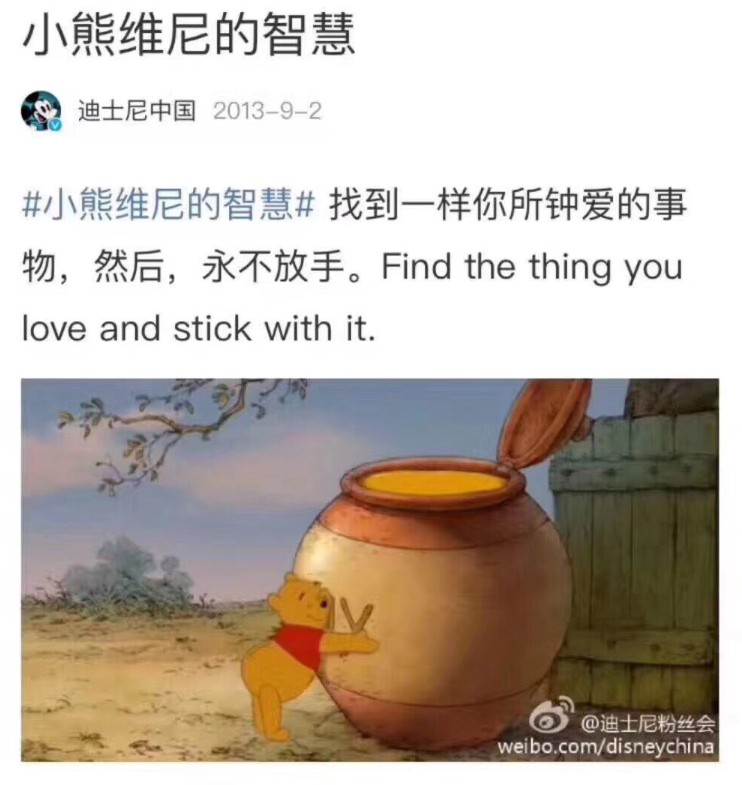

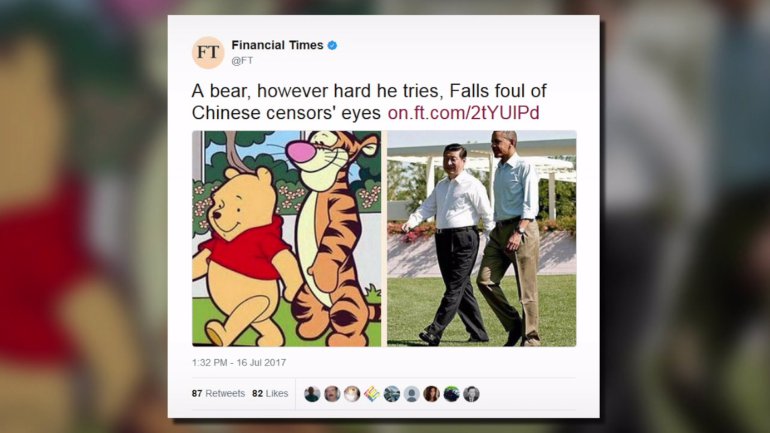
The original meme that prompted the government to ban Pooh in 2013.
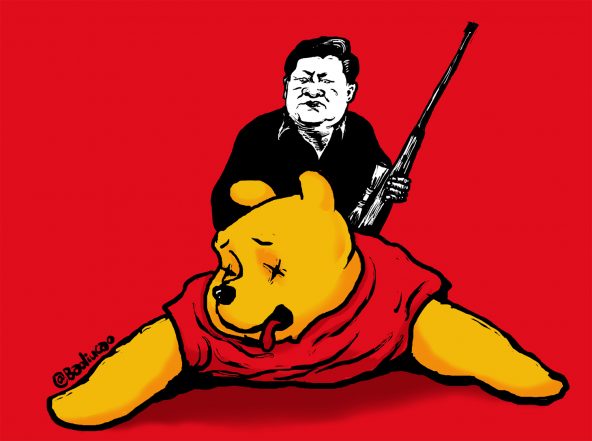
Another oldie but goodie expressing Xi’s disdain for Pooh, created by cartoonist Badiucao in the China Digital Times.
Emperor Xi
An obvious one here. Graphics emerged with references to past emperors of China, emphasizing the point that this new proposal is reminiscent of past Chinese rulers and dictators. Some of these graphics censored include:
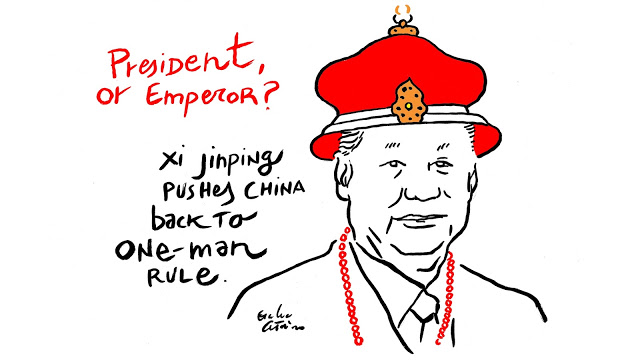
Cartoon created on political activism website, ChannelDraw.
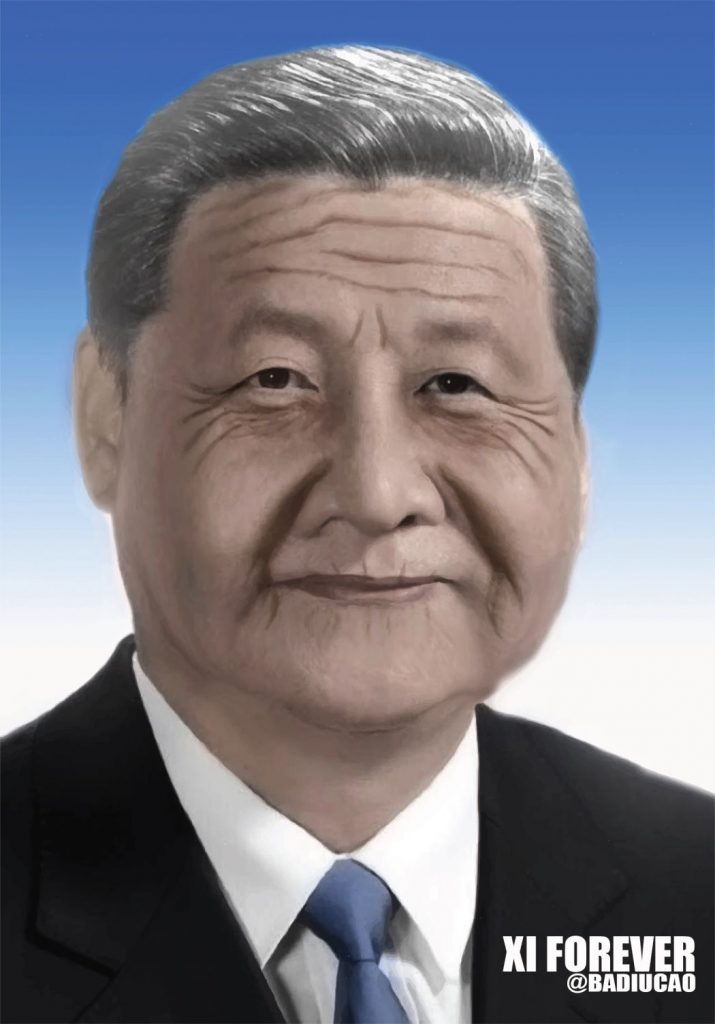
Graphic created after the announcement by Badiucao, prolific political activist and cartoonist.
Silver lining?
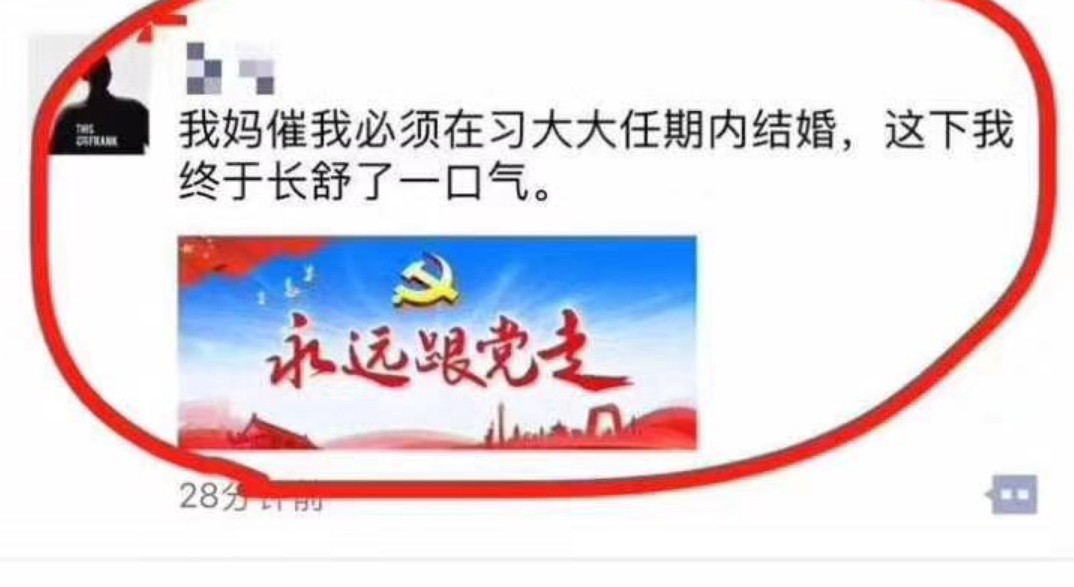
Perhaps the best of the memes, combining as it does a joke about Xi’s term extension and a joke about the common Chinese pressure to get married. It reads: “My mom said that I have to get married before Xi Dada’s term in office ends. Now I can breathe a long sigh of relief.”
Don’t forget the bunnies
While the latest news is sure to keep the censors busy for some time, they’ve been waging another war in China this year against #Metoo, which has recently come to the country and has not been well-received by a government uncomfortable with any form of protest (read our article on protest in China here). Initially the hashtag #woyeshi went viral, which literally means “me too”. When that was banned, people got creative. Introducing the rice bunny. Rice in Mandarin is mi and bunny tu, pronounced basically “me too”. Now China’s internet is awash with images of bunny and rice combos, that is until the censors catch up. Bunnies and Pooh bears – China’s internet might be censored, but it’s never boring.

The Rice Bunny is against sexual harassment. Image from @七隻小怪獸 on Weibo
4 Oct 2016 | Asia and Pacific, Awards, China, Fellowship, Fellowship 2016, mobile, News and features

In April 2016 the US government called China’s Great Firewall a barrier to trade. This came just months after the US criticised China for cyber spying on American companies, or what the Justice Department called the “great brain robbery”.
“Obama keeps saying that if China continues employing its hacking units to attack US companies, America will tear down the Great Firewall,” Charlie Smith, co-founder of GreatFire, the anonymous group of individuals who work towards circumventing China’s Great Firewall and winners of the 2016 Index on Censorship Freedom of Expression Award for digital activism, told Index. “Great – so tear it down, let’s go.”
But it’s not happening, Smith added.
Over on the other side of America’s political spectrum, US senator Ted Cruz has been busy over the last month trying to get the US Congress to act to “prevent the Obama administration from giving the internet” to China. Cruz failed in his mission, as on 1 October the US gave up its remaining control over the internet, with the California-based Internet Corporation for Assigned Names and Numbers (ICANN) no longer under the direction of the Department of Commerce.
There are now fears that the change will open the door for authoritarian governments, including China’s, to get control of the network of networks, leading to greater censorship.
In Cruz’s first letter to ICANN, kicking off his attempt to stop the move, the former presidential hopeful quoted GreatFire’s research into internet censorship in China.
“I then reached out to them and said: ‘Hey, we’re GreatFire, what more do you want to know?’” Smith said. “ICANN has a representative in Beijing and that representative sits in the Cyberspace Administration office, which is censorship central, so Cruz’s campaign was very interested in that.”
Although GreatFire would not align themselves with a political party, Smith added that if Cruz really believes what he is saying and GreatFire can help, the organisation will support him on this issue.
GreatFire’s own efforts to put a hole in China’s firewall took a new turn in July 2016 with the launch of its groundbreaking new site to test virtual private networks within the country, Circumvention Central. “Stable circumvention is a difficult thing to find in China so this new site a way for people to see what’s working and what’s not working,” Smith told Index at the time.
Speaking three months on, Smith told us that although the site works and customers are overwhelmingly pleased with the service, it isn’t making as many sales as he’d hoped it would. In August the platform sold a few dozen subscriptions but Smith was really hoping to see numbers in the hundreds by this stage.
“Maybe we’re not getting enough people to the site,” Smith said. “I guess it’s timing too; people have other subscriptions that haven’t yet expired, so they’re not ready.”
“What we have done, however, is engaged with some VPN firms like a paid consultancy service and helped them improve what they are doing,” Smith added. “It’s actually been quite revealing because we can see the volatility in the market and how one service may work really well this month and next month it will basically be useless.”
GreatFire is working closely with VPN services Hide My Ass and AnchorFree, both of whom have been introductions from Index on Censorship.
The Chinese government has taken notice of Circumvention Central, sending an email to all VPN providers listed on the site asking them not to stop operating in China but to cease working with GreatFire specifically.
One reads: “Please immediately stop working with GreatFire.org. GreatFire.org is an anti-China website as declared by the Cyberspace Administration of China. We hereby express our strong concern and request you stop working with GreatFire at the earliest time possible.”
“So there’s no real serious threat from the government there,” Smith said, adding that although Chinese authorities are constantly trying to take down or attack the site, they have been wholly unsuccessful.
GreatFire is also working on its free internet browser that allows users to access content that’s behind China’s firewall. The browser is currently available in English and Chinese, but will soon be available in traditional Chinese, Arabic, Spanish, Croatian and Persian.
“We’re currently looking for publications in those languages that are blocked so we can help provide access,” said Smith.
The main focus for the future, however, is the VPN service. “We believe we have the best circumvention tool on the market and we want to show people how it works and drive adoption.”
Also read:
Smockey: “We would like to trust the justice of our country”
Zaina Erhaim: Balancing work and family in times of war
Artist Murad Subay worries about the future for Yemen’s children
Nominations are now open for 2017 Index on Censorship Freedom of Expression Awards. You can make yours here.
9 Sep 2015 | Magazine, mobile, Volume 44.03 Autumn 2015
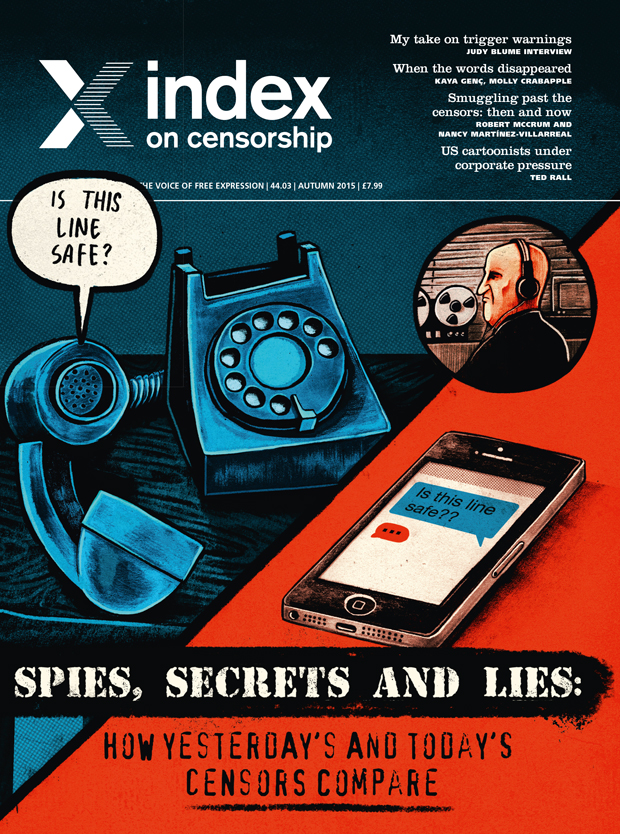 In the old days governments kept tabs on “intellectuals”, “subversives”, “enemies of the state” and others they didn’t like much by placing policemen in the shadows, across from their homes. These days writers and artists can find government spies inside their computers, reading their emails, and trying to track their movements via use of smart phones and credit cards.
In the old days governments kept tabs on “intellectuals”, “subversives”, “enemies of the state” and others they didn’t like much by placing policemen in the shadows, across from their homes. These days writers and artists can find government spies inside their computers, reading their emails, and trying to track their movements via use of smart phones and credit cards.
Post-Soviet Union, after the fall of the Berlin wall, after the Bosnian war of the 1990s, and after South Africa’s apartheid, the world’s mood was positive. Censorship was out, and freedom was in.
But in the world of the new censors, governments continue to try to keep their critics in check, applying pressure in all its varied forms. Threatening, cajoling and propaganda are on one side of the corridor, while spying and censorship are on the other side at the Ministry of Silence. Old tactics, new techniques.
While advances in technology – the arrival and growth of email, the wider spread of the web, and access to computers – have aided individuals trying to avoid censorship, they have also offered more power to the authorities.
There are some clear examples to suggest that governments are making sure technology is on their side. The Chinese government has just introduced a new national security law to aid closer control of internet use. Virtual private networks have been used by citizens for years as tunnels through the Chinese government’s Great Firewall for years. So it is no wonder that China wanted to close them down, to keep information under control. In the last few months more people in China are finding their VPN is not working.
Meanwhile in South Korea, new legislation means telecommunication companies are forced to put software inside teenagers’ mobile phones to monitor and restrict their access to the internet.
Both these examples suggest that technological advances are giving all the winning censorship cards to the overlords.
But it is not as clear cut as that. People continually find new ways of tunnelling through firewalls, and getting messages out and in. As new apps are designed, other opportunities arise. For example, Telegram is an app, that allows the user to put a timer on each message, after which it detonates and disappears. New auto-encrypted email services, such as Mailpile, look set to take off. Now geeks among you may argue that they’ll be a record somewhere, but each advance is a way of making it more difficult to be intercepted. With more than six billion people now using mobile phones around the world, it should be easier than ever before to get the word out in some form, in some way.
When Writers and Scholars International, the parent group to Index, was formed in 1972, its founding committee wrote that it was paradoxical that “attempts to nullify the artist’s vision and to thwart the communication of ideas, appear to increase proportionally with the improvement in the media of communication”.
And so it continues.
When we cast our eyes back to the Soviet Union, when suppression of freedom was part of government normality, we see how it drove its vicious idealism through using subversion acts, sedition acts, and allegations of anti-patriotism, backed up with imprisonment, hard labour, internal deportation and enforced poverty. One of those thousands who suffered was the satirical writer Mikhail Zoshchenko, who was a Russian WWI hero who was later denounced in the Zhdanov decree of 1946. This condemned all artists whose work didn’t slavishly follow government lines. We publish a poetic tribute to Zoshchenko written by Lev Ozerov in this issue. The poem echoes some of the issues faced by writers in Russia today.
And so to Azerbaijan in 2015, a member of the Council of Europe (a body described by one of its founders as “the conscience of Europe”), where writers, artists, thinkers and campaigners are being imprisoned for having the temerity to advocate more freedom, or to articulate ideas that are different from those of their government. And where does Russia sit now? Journalists Helen Womack and Andrei Aliaksandrau write in this issue of new propaganda techniques and their fears that society no longer wants “true” journalism.
Plus ça change
When you compare one period with another, you find it is not as simple as it was bad then, or it is worse now. Methods are different, but the intention is the same. Both old censors and new censors operate in the hope that they can bring more silence. In Soviet times there was a bureau that gave newspapers a stamp of approval. Now in Russia journalists report that self-censorship is one of the greatest threats to the free flow of ideas and information. Others say the public’s appetite for investigative journalism that challenges the authorities has disappeared. Meanwhile Vladimir Putin’s government has introduced bills banning “propaganda” of homosexuality and promoting “extremism” or “harm to children”, which can be applied far and wide to censor articles or art that the government doesn’t like. So far, so familiar.
Censorship and threats to freedom of expression still come in many forms as they did in 1972. Murder and physical violence, as with the killings of bloggers in Bangladesh, tries to frighten other writers, scholars, artists and thinkers into silence, or exile. Imprisonment (for example, the six year and three month sentence of democracy campaigner Rasul Jafarov in Azerbaijan) attempts to enforces silence too. Instilling fear by breaking into individuals’ computers and tracking their movement (as one African writer reports to Index) leaves a frightening signal that the government knows what you do and who you speak with.
Also in this issue, veteran journalist Andrew Graham-Yool looks back at Argentina’s dictatorship of four decades ago, he argues that vicious attacks on journalists’ reputations are becoming more widespread and he identifies numerous threats on the horizon, from corporate control of journalistic stories to the power of the president, Cristina Fernández de Kirchner, to identify journalists as enemies of the state.
Old censors and new censors have more in common than might divide them. Their intentions are the same, they just choose different weapons. Comparisons should make it clear, it remains ever vital to be vigilant for attacks on free expression, because they come from all angles.
Despite this, there is hope. In this issue of the magazine Jamie Bartlett writes of his optimism that when governments push their powers too far, the public pushes back hard, and gains ground once more. Another of our writers Jason DaPonte identifies innovators whose aim is to improve freedom of expression, bringing open-access software and encryption tools to the global public.
Don’t miss our excellent new creative writing, published for the first time in English, including Russian poetry, an extract of a Brazilian play, and a short story from Turkey.
As always the magazine brings you brilliant new writers and writing from around the world. Read on.
© Rachael Jolley
This article is part of the autumn issue of Index on Censorship magazine looking at comparisons between old censors and new censors. Copies can be purchased from Amazon, in some bookshops and online, more information here.











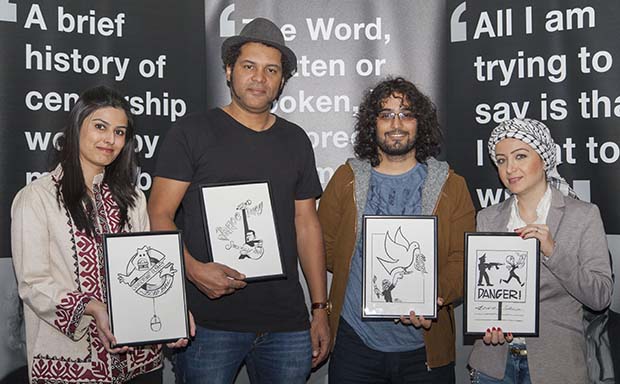
 In the old days governments kept tabs on “intellectuals”, “subversives”, “enemies of the state” and others they didn’t like much by placing policemen in the shadows, across from their homes. These days writers and artists can find government spies inside their computers, reading their emails, and trying to track their movements via use of smart phones and credit cards.
In the old days governments kept tabs on “intellectuals”, “subversives”, “enemies of the state” and others they didn’t like much by placing policemen in the shadows, across from their homes. These days writers and artists can find government spies inside their computers, reading their emails, and trying to track their movements via use of smart phones and credit cards.